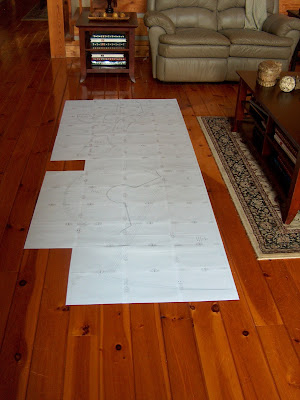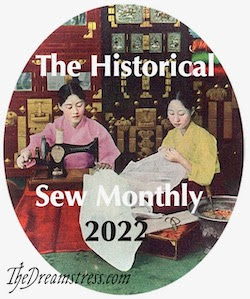November – Silver Screen: Be inspired by period fashions as shown onscreen (film or TV), and recreate your favourite historical costume as a historically accurate period piece.
November? But it's February! Saving my projects as surprises has put my posting behind and wanting wonderful photos has made my lateness even worse! I had glamorous plans for a photo shoot for this project but something even more glamorous has happened and I will share that with you in just a bit.
First, the gown!
Erin is a member of the facebook group for Historical Sew Fortnightly. One day she posted about some patterns she was developing and I responded that I would love to try out her new patterns and....well, here we are!
In September 2015, Erin sent me this wonderful e-pattern with instructions and fabulous vintage sketch.
Her instructions were titled "Polaire Edition 001 Dress, Circa 1933". Out of curiosity I Googled "Polaire" and was taken down the most fabulous internet rabbit hole where I learned about Émile Marie Bouchaud. But first, back to Erin's pattern and the gown.
Erin's pattern from 1933 is a perfect representation of the era. A fashion trend characteristic of the 1930s to the end of World War II was attention to the arm in both sleeve styles and shoulder pads. These Sears Catalog pages from 1933 and 1934 show the "styles worn at Hollywood First Nights"...
and "the newest "party times" are subtly "curve" revealing", with the proper foundation to "insure your figure lines".
Erin's pattern is all about the sleeves and the smooth line with strategic seam placement to insure a beautiful fit.
I printed out the e-pattern and taped it together.
Sewed a mock-up with a very wild fabric....
...with an even wilder sleeve lining.
I wanted to see how the pattern behaved with a contrasting sleeve lining of red satin and a gown of black lightweight duchesse satin. These sleeves were the most difficult part of a very easy pattern. I love the red peeking out of these fabulous sleeves!
 |
| The two-part inner and looped outer sleeve. |
 |
 |
| The inner sleeve is sewn to a portion of the bodice and both inner and outer sleeve are sewn to the remaining portion of the bodice. Then the loops are tacked to the bodice. |
The finished black satin gown with a touch of red satin drama!
When I started this project I had some wonderful shoes already in the closet, and a beautiful bag that was given to me by a wonderful friend!
So here I am ready for a Hollywood First Night!
If you have time you might enjoy learning a bit about Émilie Marie Bouchard. Émilie was a French singer and actress born May 14, 1874. She took the stage name "Polaire", or Pole Star. Her childhood and entry into stage is an incredible story. She entered silent film in 1909 and stayed in film until 1935. She made her first visit to the United States in 1910 where she was quite the oddity with her not-quite-yet fashion of bobbed hair, her tiny waist from practicing tight-lacing when it had been in vogue, her nose piercing, and her pet pig Mimi. Émilie died October 19, 1939 at the age of 65.
I would love to tell you everything I learned about this woman who was very much ahead of her time, but this post gives a perfect representation, some of which I have highlighted below.
This was recorded in 1923.
This was recorded in 1930 and has a nice photo compilation:
Would Émilie Marie aka Polaire, have worn this very type of dress at age 63? I should think so and with her full head of almost unruly hair and Mimi at her side I think she would have been as independent and daring as always!
Historical Sew Fortnightly
What It Is: Evening Gown
The Challenge: #11 Silver Screen
Inspiration: Émilie Marie Bouchaud aka Polaire
Fabric: Lightweight Duchesse Satin
Pattern: Polaire Edition 001 by Erin Frumet
Year: 1933
Notions: Thread
How historically accurate is it? Vintage pattern and techniques, very accurate.
Hours to complete? 15 hours
First Worn: Movie Stars and Moguls, Biltmore Estate, April 2016
Total Cost: $42.00
Love always,
Jeanette
.jpg)















































































